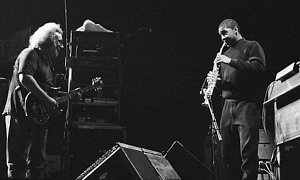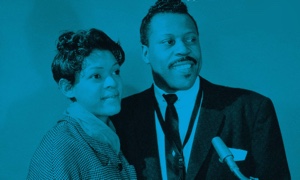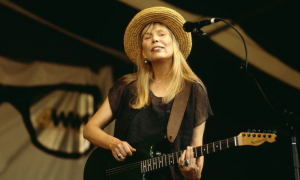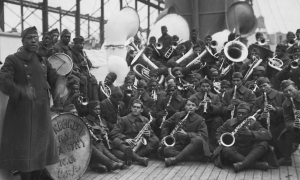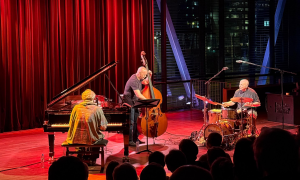Home » Jazz Articles » Building a Jazz Library » Jazz on Soul, Pop, Rock, Folk, and other intangible terr...
Jazz on Soul, Pop, Rock, Folk, and other intangible territories - Part 2
James Carter soloing on a song by Sting? A prolific French guitarist and producer, approaching his thousandth album, deconstructing one of Billy Joel's most candid love songs? A Spanish trumpeter translating the Bee Gees into the jazz language? Yes, all this will happen in this second installment of a series that insists on finding the most surprising versions of songs born in external demarcations, with absolutely no exclusions: our only frontier will be genres such as blues, gospel or Tin Pan Alley, so phagocytized by jazz that perhaps we could come to consider them, in addition to themselves, as an intrinsic part of it.
The Jazz Police (but not the Cohen's one)
 Frank Zappa
Frank Zappa Broadway The Hard Way
"Murder By Numbers"
Zappa Records
1989
Maybe seen by some of the more orthodox audience as a kind of intruder in a site like this, the fact is that when Frank Zappa decided, in its own words, "Shut Up 'N Play Yer Guitar," his performances equaled, if not surpassed, those done by any of the most renowned official fusion guitarists. There is no need to insist on their numerous albums that can be fully classified under the label "jazz-rock," nor on the multitude of songs that, scattered—and sometimes sandwiched—between material and performances that are not at all jazzy, exude that dark, thick sap. The jazziest Zappa is not only the creator of albums like Hot Rats (Bizarre/Reprise 1969) or The Grand Wazoo (Bizarre/Reprise, 1972), or the inspiration for King Kong: Jean-Luc Ponty Plays The Music Of Frank Zappa (World Pacific/Liberty, 1970), but he is also the unstoppable propagator of that musical drive (one among his many) through numerous themes such as those included in later works like Shut Up 'N Play Yer Guitar (Barking Pumpkin, 1981), Them Or Us (Barking Pumpkin, 1984) or Make A Jazz Noise Here (Barking Pumpkin, 1991). However, all this baggage is still not enough for the author of "Twenty Small Cigars," "Zoot Allures" or "Sinister Footwear" to appear in certain highly respected jazz guides, which do include other jazz-rock performers who undoubtedly once looked with admiration at many of his creations. It is not the case for this site, which contains an extended and well-deserved portrait of this musician, as well as various articles examining the promiscuous relations of Zappa with jazz, as, e.g., Zappa and Jazz.
"Murder By Numbers" comes from one of three official albums (plus at least one unofficial, captured on In Barcelona) that document the brief existence—from February to June of '88—of a 12-member big band that, unfortunately, spent almost more time rehearsing than touring. It is not one of Zappa's best albums, nor is it one of the most representative of his fusionist side, but its reading of one of Sting's most jazz-oriented compositions is somewhat more convincing than others issued from the jazz galaxy and includes several points of interest: firstly, it features Sting himself, who after a deferential introduction by Zappa as master of ceremonies quickly wins over the audience, then evolves with increasing singing enthusiasm to give way to a brief but exciting blues-inflected solo by the leader; secondly, most of the different editions of the album do not incorporate this cut, which makes it a rarity (and even more so is the unedited video we attach below, which contains a fiery intervention from tenor saxophonist Albert Wing and a—partially—different solo by the leader); and thirdly, its rendition ends by perceptively linking with a neat exposition of "Stolen Moments," the undying Oliver Nelson theme which precedes this cut in the expanded editions of the album.
 Christian McBride
Christian McBride Sci-Fi
"Walking On The Moon"
Verve Music Group
2000
Sting's jazz beginnings are well known. In the early '70s, he was part of various combos in the Newcastle scene, from a big band to a jazz-rock group named Last Exit (a British band, not to be confused with the American free jazz group). Post The Police, Sting would once again engage with jazz through prestigious collaborations with the Gil Evans Orchestra in 1987 and the realization of several albums featuring various jazz-spectrum luminaries. In turn, Christian McBride, perhaps the most ubiquitous and complete bassist today, acts through his countless collaborations as an important link between venerable figures residing either in tradition or in a seemingly unstoppable evolution, with later stars now in their full and spectacular maturity. He is quite comfortable in the mainstream, whether traditional, contemporary or fusion, but that does not stop him from occasionally venturing into more experimental territory, such as his collaborations with John Zorn. Sting's "Walking On The Moon" is included on an album with which the Philly bassist seems to pay tribute to his many diverse affiliations and influences. McBride alternates the woody, deep-rooted sound of his double bass with the electric bass, an instrument with which he successfully outlines the opening melody of the song, exuding echoes that suggest to us a slowed down Stanley Clarke, with his plucking under tranquilizer effects. The piece is dominated throughout by a melancholic atmosphere but its haunting bridges (actually the chorus of the original song, cleverly modified) and McBride's closing dialogue with the somber, at times mournful bass clarinet of a restrained James Carter are undoubtedly some of the finest moments on this remarkable album.
Pal Joel
 Ben Sidran
Ben Sidran Ben There, Done That [Live Around The World]
"New York State Of Mind"
Sunset Blvd Records
2018
What we could consider Billy Joel's initial stage (until the arrival of the '80s) is peppered with a handful of very attractive compositions to be revised from a jazz perspective. Some of them feature the participation of illustrious jazz musicians, through occasional stellar solos (Phil Woods on "Just The Way You Are," Freddie Hubbard on "Zanzibar"), or even as main members of albums such as The Stranger (Columbia, 1977) and 52nd Street (Columbia, 1978). Other songs, which lack such interventions, nevertheless contain enough traces in their harmonic skeleton to allow careful observations by the jazz congregation. Eclectic writer, producer, composer, pianist and singer Ben Sidran performed one of those signature tracks, "New York State Of Mind," live in December 2001, not from any renowned concert hall in the city that never sleeps but from the maybe misleadingly named Pizza Express in London. It was by no means the first time he had covered that melody on a record: shortly after the original was released in 1976, and joined by the much-missed trumpet of Woody Shaw, Sidran starred in the first of the numerous versions that have followed of a song that, over the years, has become one of the many unofficial anthems of NYC. Furthermore, he would cover it on at least two more occasions, on Have You Met... Barcelona? (Orange Blue, 1989), and on the album that contains the song selected here. The Chicagoan skillfully makes his vocal limitations a stylistic virtue, while relying on excellent pianism and his captivating rhetoric, sometimes naïve, sometimes trenched by a touch of lucid, seasoned disenchantment. Here we are told of easily recognizable urban feelings, starting with a cocktail bar jazz atmosphere that slowly evolves into a juicy and convincing John Coltrane-esque climax, mainly thanks to the stimulating participation of Bob Malach on tenor, strongly supported by Sidran himself, his son Leo Sidran on drums and Billy Peterson on bass.
 Noël Akchoté
Noël Akchoté (Plays) Barry White/Julio Iglesias (2015)
"Just The Way You Are"
Noël Akchoté Downloads
2018
The unclassifiable French guitarist, producer and writer Noël Akchoté picks up Joel's compositional baton. The Parisian will surely surprise those who do not know the character, capable of dedicating his cubist versions to creators as diverse as Giovanni Pierluigi da Palestrina, Béla Bartók or Anthony Braxton, but also to Johnny Cash, Britney Spears or Julio Iglesias. With a—seemingly—cryptic language where other quite lateral guitarisms converge (from Baden Powell to Derek Bailey, passing through John Abercrombie), Akchoté's production discourages the most persevering: take a look at his tireless discography, which seems to increase at a rate of approximately two recordings per week. Among its nooks and crannies lies an album dedicated to the work of Barry White, who had previously covered the above-mentioned classic "Just the Way You Are." This is a theme that works as a perfect opening track on many albums, especially jazz vocal-led ones, but which has also been revisited by distinguished instrumentalists such as Ahmad Jamal, George Adams, Joe Pass or the also French guitarist Bireli Lagrene. Akchoté begins his deconstruction with his usual oblique affection and that somehow delicate, always condensed, approach: his multidimensional fingering stars subtly, observing the basic harmonies of the theme and allowing the melody to emerge unabashedly, while the second part of his performance moves away from the original theme. Certainly, our man in Paris requires the listener's prior knowledge of the themes he covers and careful, repeated listening to capture his unique language and strategies in the revised material. If we meet these requirements, the result will surely reveal an unexpected look at the heart of the themes he covers.
Two Organic Scotts
 Rhoda Scott
Rhoda ScottJazz In Paris
"It's Impossible"
Sunnyside Records
2000
The coincidence of surname, era, sex and instrument in professional jazz musicians may be seen as curious by the fan, but those involved probably experience it differently. The case of organists is striking, with at least four Smiths—understandable given such a family name—coinciding in their work from the '70s onwards: Jimmy Smith, Dr. Lonnie Smith, Lonnie Liston Smith and Johnny "Hammond" Smith. Something similar happens with our next two protagonists, who share generational and stylistic affinities, although with their logical differences to technique, discourse, and musical approach..
Already in her eighties, but tremendously active, Rhoda Scott does not enjoy the recognition that she undoubtedly deserves: one only has to look at some renowned jazz guides and general music websites to confirm a certain oblivion of her. This circumstance is likely largely due to her decision to settle in France, fleeing the sexism prevalent in her professional environment. Another reason may be her frequent forays into smooth jazz and easy listening. But even in these areas, the so-called "Barefoot Lady" finds numerous spaces to pour out her essences, which range from gospel sounds to an often softened hard bop, passing through a cheerful swing. Her '70s period with the French label Barclay offered very substantial albums, such as the excellent 1977 date with Kenny Clarke, Jazz In Paris, also known as Rhoda Scott + Kenny Clarke. Here we find a captivating, sleepily late-night rendition of "It's Impossible" based on Perry Como's adaptation for the English-speaking market of Armando Manzanero's classic "Somos novios." Scott pampers and embellishes the melody to bring it to a finale where she exploits both the harmonic potentialities of the song and the timbral possibilities of her instrument, supported, in a very discreet way, by the rhythmic father of bebop.
 Shirley Scott
Shirley Scott A Walkin' Thing
"When A Man Loves A Woman"
Verve Records
1996
Unlike Rhoda, Shirley Scott likely remains imprinted in the retinas of the most veteran fans as the most visible female face of '60s soul jazz. The Philadelphian forged successful partnerships with outstanding saxophonists such as Eddie "Lockjaw" Davis and Stanley Turrentine, developing with the former her most hard bop persona, as her participation in his three Cookbooks (prestige, 1958), or her inclusion in the memorable Very Saxy (Prestige, 1959), with Davis himself plus Buddy Tate, Coleman Hawkins and Arnett Cobb. On the other hand, her various albums with her trio or quartet (with Turrentine) represent her style par excellence—some soul jazz with more commercial overtones. A fan of covering hits from other musical latitudes, Scott has covered Percy Sledge's super hit "When A Man Loves A Woman" at least twice in her discography. The second of these is found on her penultimate album, A Walkin' Thing (Verve Records, 1996), a mature work in which she achieves an essential simplicity, without the easy recourse to obviousness and saccharine treatments that had often been used before. Excellently supported by Tim Warfield and an extraordinary Terell Stafford, the so-called "Queen of the Organ" pays tribute here, among others, to Oliver Nelson, Harold Ashby and Art Blakey, containing her speech and almost always giving the initial prominence to the winds. With the famous principle of "less is more" well in mind, Scott's solitary look sacralizes the Calvin Lewis and Andrew Wright theme, accentuating its latent gospel vein and enriching it harmonically, while reducing the tempo and dynamics to the minimum possible. A heartfelt rendition that despite its very restrained treatment perhaps deserves to be among the best moments of her extensive discography.
An Iberian regard over foreign materials
 Joan Sanmartí
Joan Sanmartí Otras Canciones
"Clair"
Satchmo Jazz Records
2003
Regardless of his undeniable qualities as a performer, composer and arranger, Joan Sanmarti is one of those musicians virtually unknown at a popular level, even in his own country. With forty years of professional experience behind him, the Catalan has collaborated with successful compatriots such as Agusti Fernandez, Jordi Rossy, Marc Miralta and Marco Mezquida. In his discography, Sanmartí makes exceptional and erudite adaptations to jazz (sometimes in its most experimental aspect) of material far removed from his stylistic parameters and of very uneven quality, which may come from the Real Book, Igor Stravinsky, or late-Francoist Spanish pop. On an instrumental level, his main influence is that of Pat Metheny, especially in the Missourian's early stages. However, sometimes he may sound like John Scofield or suggest distant guitar echoes of Catalan jazz-rock, a Mediterranean version of the fusions prevalent in the '70s. From its title, Otras Canciones (Other Songs, in English) makes it clear that the spotlight is going to fall on an unexpected repertoire in jazz latitudes, this time focused on some traditional and pop songs that were most played on Hispanic radio stations in the late '60s and '70s. As with Akchoté, to properly understand Sanmartí's work, prior knowledge of the original themes reviewed would be highly recommended. Still, we will not force our readers to experience something that can be as unnerving as it is lethargic. And although the emphasis is on Spanish groups, the task is made easier by including some universal hits from the then very distant Anglo-Saxon universe, such as this magnificent "Clair," a work by the accomplished Irish melodist Gilbert O'Sullivan. Sanmartí slows down the jovial, candid walkin' of the original (which featured a rhythm guitar suggestive of the legendary Freddie Green) and builds one of the most painfully beautiful transformations on the album with his luminous sound and manners. His wisdom in harmonic treatment spurs on the mastery of his accompanists, the extraordinary Carles Benavent and David Xirgu, with the former's prodigious electric bass finding depressurized spaces, towards the end of the piece, where he can meditate with a relaxed—although not exempt from flamenco outbursts—oratory.
 David Pastor
David Pastor The Film Sessions
"Stayin' Alive"
Dot Time Records
2019
From the other side of the Spanish Ebro River comes one more surprising transformation, in this case of a classic '70s club. Its creator is the impressive trumpet player David Pastor, born by chance in Germany but raised in the municipality of Sedaví, bordering the city of Valencia. The mention of the former, a town with barely 10,000 inhabitants, is not gratuitous, as it acts as a powerful jazz driving force in its area with its tireless, courageous and laudable Sedajazz, a collective of independent musicians grouped in a music management company that embraces various bands and ensembles. It also channels a record label (Sedajazz Records), a virtual magazine, and the organization of events, workshops and seminars. Pastor began his training in the '70s in that small but vibrant location, taking as a reference illustrious masters as diverse as Howard McGhee or Charles Tolliver. Although he prefers not to be qualified as just a jazz musician, there is a deep hardboppish foundation in him: if one listens in a blindfold test to some of his solos, the teachings of Chet Baker, Lee Morgan or Art Farmer appear wisely integrated, as do the later ones of Tom Harrell, Lester Bowie or Dave Douglas, without ever falling into unimaginative imitation. On the contrary, all these traces illuminate the Valencian's superb discourse, which is as substantial in ideas as it is vigorous in its sound and materializes in a determined intonation and fluid phrasing. A lover of unexpected approaches to other people's themes, Pastor shakes up the Gibb brothers' song by inflating it with a New Orleans' first line vibe. Driven by a more than reliable rhythm section, the ensemble drips groove in torrents while catalyzing the energies present in a live acoustic session in the Studio Nord Bremen, which we imagine as electrically charged as the dance floors for which the song was originally designed. Dust off that disco ball and... yeah, you should be dancing!
Sax women in charge
 Nathalie Loriers/Tineke Postma/Nicolas Thys
Nathalie Loriers/Tineke Postma/Nicolas Thys We Will Really Meet Again
"Luiza"
W.E.R.F. Records
2016
Musical essences as diverse as those of Wayne Shorter, Dave Liebman or Grover Washington, Jr. are in the DNA of Dutch saxophonist Tineke Postma. But there also are outsiders like Roscoe Mitchell who, in 2015, thanks to a performance at the North Sea Jazz Festival, marked a turning point in the already consolidated career of this extraordinary musician. Her first recording efforts already revealed a formidable performer and brilliant composer, settled in post-bop and that current fusion that flees from the gymnastic to immerse itself in introspective moods, through the invocation of oblique musical manoeuvers. Postma, always equipped with an exquisite sound, has since evolved incorporating some investigatory atonality that permeates albums such as the very inquisitive Freya (Edition Records, 2020) or Aria (Edition Records, 2023), a disc inspired by vocal resonances emanating from Maria Callas. But the Frisian deserves also to be listened to carefully as a sidewoman or co-leader. In the latter case, she distills rewarding traces of Lee Konitz on several albums with the Belgian pianist Nathalie Loriers, cautiously examining the melodic vestiges of a classicism varnished with timeless echoes. This is the case of this disarming, coolish "Luiza," the indelible melody masterfully chained by the Brazilian composer and pianist Antonio Carlos Jobim in 1981. A song perhaps better described as being a songwriter one, with its deep MPB vibes than for being bossa nova, a genre much closer to jazz, with its reciprocal feedback. Loriers increases, if possible, the desolate sadness of the original, a poem to the loving despair, and follows in Bill Evans footsteps as she progresses in her open-hearted speech. Postma subtly supports her, then wipes away her tears under a moving solo, with a sound that delves into the most remote part of our musical being. The counterpoint is provided by Nicolas Thys' double bass, which brings a certain air of contemporary tension in various short vamps added to the harmonic structure of the original, which serve as a comforting link between the soloists' contained lamentations.
 Travis Sullivan's Bjorkestra
Travis Sullivan's Bjorkestra Enjoy!
"Army Of Me"
KOCH Records
2008
The overwhelming presence of Lauren Sevian stands out when it comes to facing (as she defines it in her website) the king of all instruments. In her powerful articulation, we can taste the main line of the baritone sax, with notes of Harry Carney and Pepper Adams mixed with iconoclastic scents à la Hamiet Bluiett. But beware, her recorded production is frustratingly scarce: more than fifteen years after her first album, her output as an individual leader remains meager, concentrated on the highly recommended Blueprint (Inner Circle Music, 2008) and Bliss (Posi-Tone Records, 2018). For this reason, it is almost obligatory to inspect her recorded performances with her different combos, whether her own projects (LSQ, LSAT) or collaborative ones (Lioness, Posi-Tone Swingtet, The Elephunk Band), and as a sidewoman in other's bands. Her performances as a regular or permanent member of orchestras such as the Mingus Big Band, the Steven Feifke's Generation Gap Jazz Orchestra or the Travis Sullivan's Bjorkestra stand out. Of the latter, we highlight this effectively reharmonized "Army of Me," a piece by the eclectic and multifaceted Icelandic artist Björk. This intense cut (probably the most interesting on the album) takes Sevian into a more electric and wild arena than her usual one. It begins with a martial air that takes us back to the Napoleonic era and gives way to Ben Monder, who opens fire with a short but devastating statement. After a vocal and ensemble passage, the saxophonist starts easy-going to evolve in crescendo with combative forcefulness, delivering a superlative solo. After this climax, the leader speaks to rouse the forces, initially almost a cappella and atonal, to end by leading the entire formation towards a fulminating finale.
Tags
Building a Jazz Library
Tineke Postma
Artur Moral
Broadway The Hard Way
Zappa Records
Frank Zappa
Hot Rats
The Grand Wazoo
King Kong -Jean -Luc Ponty Plays The Music Of Frank Zappa
Make A Jazz Noise Here
Shut Up 'N Play Yer Guitar
Them Or Us
Zappa and Jazz
Barcelona
Sting
Oliver Nelson
Sci-Fi
Verve Music Group
Gil Evans
Christian McBride
John Zorn.
Stanley Clarke
James Carter
Ben There, Done That [Live Around The World]
Self Produced
Billy Joel
Phil Woods
Freddie Hubbard
ben sidran
Woody Shaw
Have You Met... Barcelona?
Bob Malach
Leo Sidran
Billy Peterson
(Plays) Barry White/Julio Iglesias (2015)
Noel Akchote
anthony braxton
Johnny Cash
Baden Powell
Derek Bailey
John Abercrombie
Ahmad Jamal
George Adams
Joe Pass
Bireli Lagrene
Jazz In Paris
Sunnyside
Jimmy Smith
Dr. Lonnie Smith
Dr. Lonnie Liston Smith
Johnny "Hammond" Smith
Rhoda Scott
Barclay
Kenny Clarke
Perry Como
A Walkin' Thing
Verve Records
Shirley Scott
Eddie "Lockjaw" Davis
Stanley Turrentine
Very Saxy
Buddy Tate
Coleman Hawkins
Arnett Cobb
Tim Warfield
Terell Stafford
Harold Ashby
Art Blakey
Otras Canciones
Satchmo Jazz Records
Joan Sanmarti
Agusti Fernandez
Jordi Rossy
Marc Miralta
Marco Mezquida
Freddie Green
Carles Benavent
David Xirgu
The Film Sessions
Dot Time Records
David Pastor
Valencia
Sedajazz Records
Howard McGhee
Charles Tolliver
Chet Baker
lee morgan
Art Farmer
Tom Harrell
Lester Bowie
Dave Douglas
We Will Really Meet Again
Wayne Shorter
Dave Liebman
Grover Washington Jr.
Roscoe Mitchell
north sea jazz festival
Freya
Aria
Nathalie Loriers
Antonio Carlos Jobim
Nicolas Thys
Enjoy!
KOCH Records
Lauren Sevian
Harry Carney
Pepper Adams
Hamiet Bluiett
Blueprint
Bliss
Steven Feifke
Travis Sullivan
Bjork
Comments
PREVIOUS / NEXT
Support All About Jazz
 All About Jazz has been a pillar of jazz since 1995, championing it as an art form and, more importantly, supporting the musicians who make it. Our enduring commitment has made "AAJ" one of the most culturally important websites of its kind, read by hundreds of thousands of fans, musicians and industry figures every month.
All About Jazz has been a pillar of jazz since 1995, championing it as an art form and, more importantly, supporting the musicians who make it. Our enduring commitment has made "AAJ" one of the most culturally important websites of its kind, read by hundreds of thousands of fans, musicians and industry figures every month.










